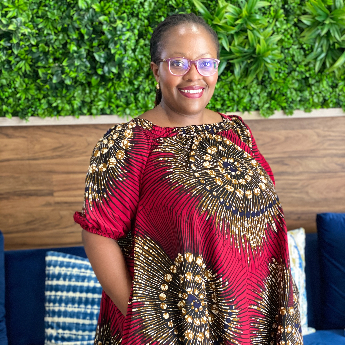An award-winning chartered accountant, the mother of two girls, and a former Group CFO and Interim CEO of one of SA’s big listed firms, UCT GSB EMBA alumna, Cheryl-Jane Kujenga is vocal about transformation and gender diversity in the workplace - and why we need more women at the top.
Cheryl-Jane Kujenga, or “CJ” as she is known affectionately by those who are close to her, credits her mother for much of her success. Growing up in Zimbabwe with a brother and a sister, her mother worked hard running a hospitality businesses — but she always made time for her children. “From a very young age, I understood that women can be both; both a professional and a mother.”
But as she began advancing in her own career, working at senior and executive levels, she experienced first-hand just how hard this can be. Professional women face very significant challenges in workplaces, especially when it comes to executive leadership, she believes. When she did her EMBA at the University of Cape Town Graduate School of Business (UCT GSB), she channelled these experiences into her thesis entitled: Breaking the second glass ceiling: Exploring the career progression of women from senior leadership to C-suite roles.
This gave her further insight into the executive environment in South Africa. “I feel the business case for gender diversity in SA has not been articulated well. While many business leaders have a theoretical or conceptual view of what it means, there is not enough that is being done practically to support women and help them develop their executive leadership skills at top level.”
Cheryl-Jane completed her degree in 2017, graduating cum laude, no mean feat considering that she had just had a second child, was a single mother and was working as a partner and Strategic Growth Markets Leader at EY. Shortly afterwards, she took on the position as group CFO and later interim CEO of Adcorp Holdings Ltd. She describes this as her most challenging role to date as it coincided with a tumultuous time in the company’s history and she had to hit the ground running. “I had to quickly restructure the finance team, improve the reporting function and reduce the cost base so as to support the business turnaround.”
Her hard work did not go unnoticed: She was awarded the 2019 Private Sector CFO of the Year by the African Women Chartered Accountants (AWCA) and has been nominated for the CFO Forum’s 2020 CFO of the Year Award.
She decided to take some time out in 2020 to contemplate her next move, spending the lockdown period with her daughters. “Women today still function in a social reality shaped by traditional views of women’s primary role being that of a mother and care-giver,” she said in a recent talk to UCT GSB Alumni at the school’s annual Women in Business conference. No surprise that these views prevail also in many organisational structures in corporate South Africa, which are predominately white and male. Cheryl-Jane mentioned the example of former Anglo American chief executive Cynthia Carroll who as recently as in 2009, was described as “sexually frustrated” because of an executive business decision she made.
Such views compound the psychological prejudice many women leaders face, says Cheryl-Jane. Consider that almost 40% of SA moms are single mothers and sole breadwinners, the pressures women face in South Africa are clear. Yet, the need to get more women into positions of leadership is more important than ever. Recent research from McKinsey has demonstrated that the case for gender diversity in top teams is just getting stronger. Its 2019 analysis finds that companies in the top quartile for gender diversity on executive teams were 25 percent more likely to have above-average profitability than companies in the fourth quartile — up from 21 percent in 2017 and 15 percent in 2014. Furthermore, the report highlights the importance of inclusion — creating work environments characterised by equality and fairness of opportunity and freedom from bias and discrimination — as a factor in performance.
“We need to achieve critical mass for women in the workplace and men have to be a part of the conversation. Not just men who tick the diversity boxes at their organisations, but those who know that having more women on board is good for business and proven to boost the bottom line.”
Cheryl-Jane also highlights the role of mentorship and coaching here and is herself a mentor and coach to several young women.
In her next position, she says she would like to work as a CFO as well as having a strategic and operational role. “For me the reality is, I enjoy what I do. I don’t want to look back on my life and think it was half-lived or that I was afraid to try something. I have always felt that if I leave my kids in the day, it must be for something that challenges me. Early in my career I had one job where I had time to play Solitaire during the day, I was bored and disengaged, and when I left, I promised myself, never again!”

























































































































